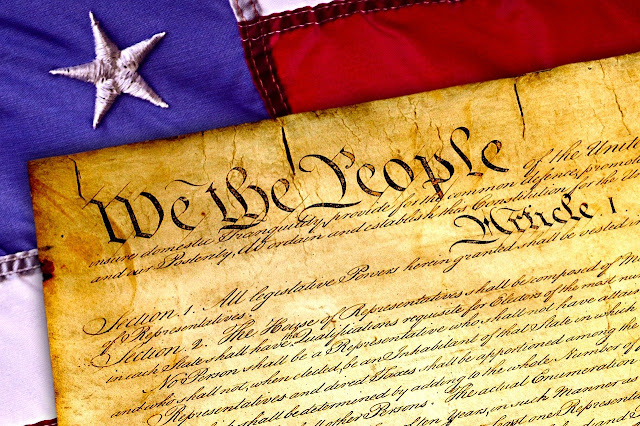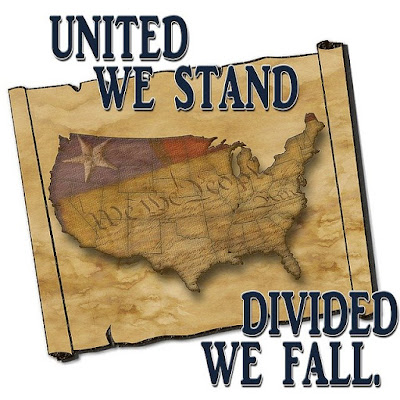The Collective personal subjective values of the majority are paramount and exert a greater amount of influence than do individual personal subjective values in the democratic process. Social values and personal values when in conflict lead to cognitive dissonance and evoke negative emotional dispositions. Dominant societal values are often referred to as (social values) influence, laws, ethics, morality, and policies and procedures of the social welfare system through the democratic process.
Personal subjective values enable individuals within any specific social system to compete for resources and opportunities. Constituents adopt values through the process of socialization commonly referred to as acculturation.
Personal subjective values enable individuals within any specific social system to compete for resources and opportunities. Constituents adopt values through the process of socialization commonly referred to as acculturation.
 |
| The Constitution of the United States |
Personal subjective values:
Personal values are guiding principles and provide individuals a sense of what is important and what is good. Values influence the standards and, or principles in which we live by influencing moral judgment (decision based on what is right or wrong, and or what constitutes good, or bad ) with regards to social norms, ethics, and laws within the context of society.
Values are generalized from one situation to the next and arranged into a hierarchy of importance in relation to one another. One's personal values influence the decision-making process and can reshape beliefs, and self-concepts. Environmental factors have a profound impact on human behaviors and human behaviors shape the environment in order to increase the probability of survival.
Social Values:
Social values influence ethics, laws, morality, and social norms. The aforementioned are culturally defined.Merriam-Webster's online dictionary defines culture in the following manner,
" The set of shared attitudes, values, goals, and practices that characterize an institution or organization."
Citizens within any specific social system adopt social values as a result of rewards and consequences through a process called socialization.
Social values enable a member of society to work together towards collective goals and to achieve the common good. Values can conflict between individuals, groups, and macro-systems(civilizations, and or societies).
Ethics:
Are principles of what's good or bad, and right or wrong, and are culturally driven? Through the democratic process, social values influence legislation and laws.
Morality:
Morality is one's own sense of what's right or wrong and sometimes comes into conflict with ethics and laws. However, the sound moral judgment ought to be influenced by rational thought processes; therefore, one ought to take into account laws when making a moral judgment.
Social Norms:
Social norms are principles of conduct that are socially accepted.
Goals:
Goals are observable measurable and often associated with a time of completion, and or deadlines; for example, short-term goals are established and can be accomplished within a six months period; however, the accomplishment of long-term goals exceeds six months and may take several years to accomplish.
Social and personal values influenced goal setting and one's personal goals ought to be anchored to the individual's values. Societal goals ought to be rooted in social values.
The second paragraph of the declaration of independence divulged, National Archives
The institutionalization of the United State's government is a means to an end and those ends are to secure the rights of the governed! As evident the preamble to the Constitution of the United State's,
With all sincerity, I would like to believe in my hearts of hearts that life, liberty, and the pursuit of happiness remain to be to this day and all days to come the most basic, yet fundamental of social values that drive the democratic process.
General welfare clause let us look at the general welfare clause; article one, section eight one the constitution of the united states of America reads,
What does this mean?
The general welfare clause means that any taxes levied must be spent on the benefits of the united states as a whole and not be spent on a special interest. The federal government must promote the general welfare, and it must be done without bias.
Many proclaim to value equality, equal protection of the law," life, liberty and the pursuit of happiness,' or as John Locke would say," All mankind...being equal and independent, no one ought to harm another in his life, health, liberty or possessions!'"
“We hold these truths to be self-evident, that all men are created equal, that they are endowed by their Creator with certain unalienable Rights, that among these are Life, Liberty and the pursuit of Happiness. That to secure these rights, governments are instituted among men, deriving their just powers from the consent of the governed. "
The institutionalization of the United State's government is a means to an end and those ends are to secure the rights of the governed! As evident the preamble to the Constitution of the United State's,
"We the people of the United States, in order to form a more perfect union, establish justice, insure domestic tranquility, provide for the common defense, promote the general welfare, and secure the blessings of liberty to ourselves and our posterity, do ordain and establish this Constitution for the United States of America."
 |
| We the people of the United States |
With all sincerity, I would like to believe in my hearts of hearts that life, liberty, and the pursuit of happiness remain to be to this day and all days to come the most basic, yet fundamental of social values that drive the democratic process.
General welfare clause:
General welfare clause let us look at the general welfare clause; article one, section eight one the constitution of the united states of America reads,
"The Congress shall have Power to lay and collect Taxes, Duties, Imposts and Excises, to pay the Debts and provide for the common Defense and general Welfare of the United States."
What does this mean?
The general welfare clause means that any taxes levied must be spent on the benefits of the united states as a whole and not be spent on a special interest. The federal government must promote the general welfare, and it must be done without bias.
Many proclaim to value equality, equal protection of the law," life, liberty and the pursuit of happiness,' or as John Locke would say," All mankind...being equal and independent, no one ought to harm another in his life, health, liberty or possessions!'"
Author: Gregory M. Green is the author of various topics in the Social Sciences section of Inveigle Magazine. He writes on informative topics that bring awareness to the world. We are so pleased to have him as a part of Inveigle Magazine's Team. Follow us @Inveiglemagazi1 View more articles by Gregory M. Green
Inveigle Magazine


